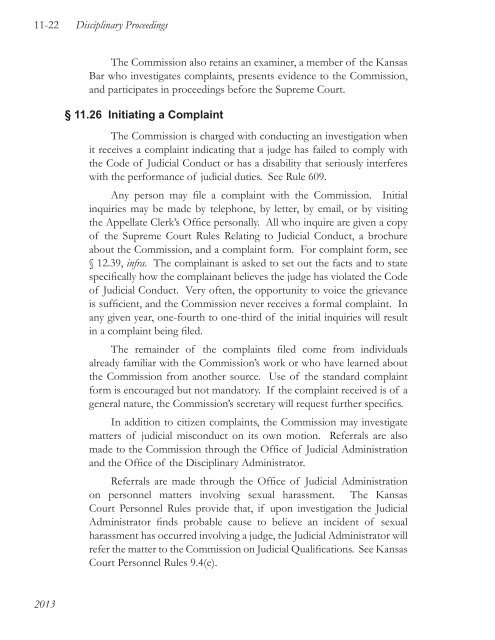CHAPTER 11 - Disciplinary Proceedings - Kansas Judicial Branch
CHAPTER 11 - Disciplinary Proceedings - Kansas Judicial Branch
CHAPTER 11 - Disciplinary Proceedings - Kansas Judicial Branch
Create successful ePaper yourself
Turn your PDF publications into a flip-book with our unique Google optimized e-Paper software.
<strong>11</strong>-22 <strong>Disciplinary</strong> <strong>Proceedings</strong><br />
The Commission also retains an examiner, a member of the <strong>Kansas</strong><br />
Bar who investigates complaints, presents evidence to the Commission,<br />
and participates in proceedings before the Supreme Court.<br />
§ <strong>11</strong>.26 Initiating a Complaint<br />
The Commission is charged with conducting an investigation when<br />
it receives a complaint indicating that a judge has failed to comply with<br />
the Code of <strong>Judicial</strong> Conduct or has a disability that seriously interferes<br />
with the performance of judicial duties. See Rule 609.<br />
Any person may file a complaint with the Commission. Initial<br />
inquiries may be made by telephone, by letter, by email, or by visiting<br />
the Appellate Clerk’s Office personally. All who inquire are given a copy<br />
of the Supreme Court Rules Relating to <strong>Judicial</strong> Conduct, a brochure<br />
about the Commission, and a complaint form. For complaint form, see<br />
§ 12.39, infra. The complainant is asked to set out the facts and to state<br />
specifically how the complainant believes the judge has violated the Code<br />
of <strong>Judicial</strong> Conduct. Very often, the opportunity to voice the grievance<br />
is sufficient, and the Commission never receives a formal complaint. In<br />
any given year, one-fourth to one-third of the initial inquiries will result<br />
in a complaint being filed.<br />
The remainder of the complaints filed come from individuals<br />
already familiar with the Commission’s work or who have learned about<br />
the Commission from another source. Use of the standard complaint<br />
form is encouraged but not mandatory. If the complaint received is of a<br />
general nature, the Commission’s secretary will request further specifics.<br />
In addition to citizen complaints, the Commission may investigate<br />
matters of judicial misconduct on its own motion. Referrals are also<br />
made to the Commission through the Office of <strong>Judicial</strong> Administration<br />
and the Office of the <strong>Disciplinary</strong> Administrator.<br />
Referrals are made through the Office of <strong>Judicial</strong> Administration<br />
on personnel matters involving sexual harassment. The <strong>Kansas</strong><br />
Court Personnel Rules provide that, if upon investigation the <strong>Judicial</strong><br />
Administrator finds probable cause to believe an incident of sexual<br />
harassment has occurred involving a judge, the <strong>Judicial</strong> Administrator will<br />
refer the matter to the Commission on <strong>Judicial</strong> Qualifications. See <strong>Kansas</strong><br />
Court Personnel Rules 9.4(e).<br />
2013

















